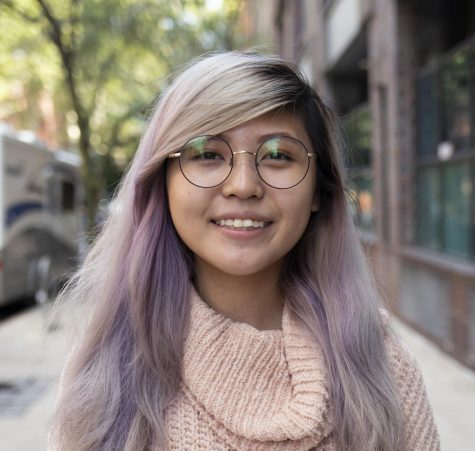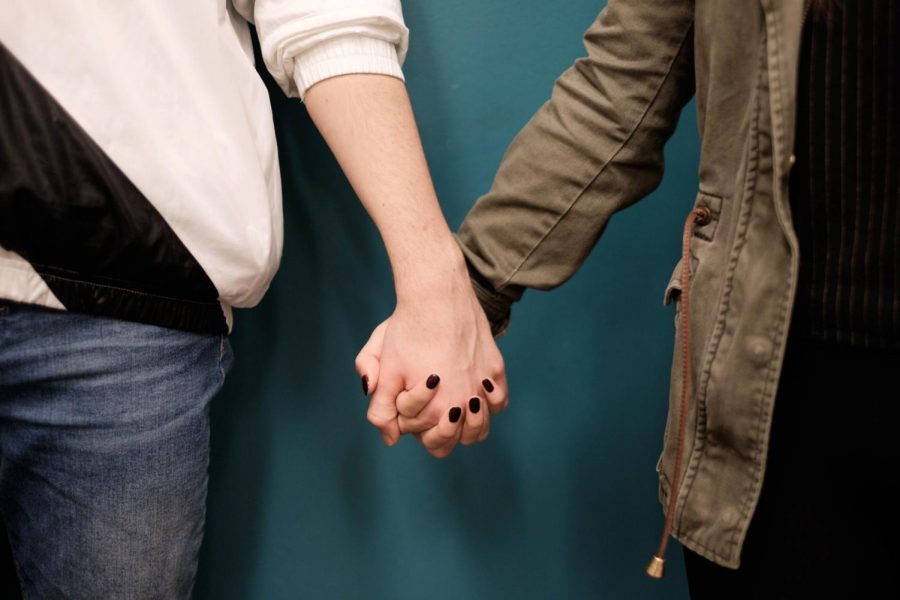Love, But Not Sex
Two NYU students hold hands.
When people think about love, they consider two components: the emotional and the physical. Many see the emotional and the physical aspects of love as relatively equal, though for those who experience some form of asexuality, the physical component may not be as strong.
Asexuaity — “ace” for short — is defined as the lack of sexual attraction toward others. This is not to be mistaken for aromantic — “aro” for short — which is defined as the lack of romantic attraction towards others.
“I’m aromantic asexual, so I’ve never been attracted to anyone,” said Cameron, an NYU student who asked to be referred to by her first name only.
Demisexuality is also a part of the asexual spectrum. Someone who identifies as demisexual does not feel sexual attraction unless there is a strong emotional connection. People can also identify as gray-A, which includes but is not limited to those who: experience sexual attraction but have a low sex drive, enjoy and desire sex but only in limited and specific circumstances and experience sexual attraction and drive but not strongly enough to want to act on them.
People can experience some form of asexuality in a variety of ways.
“I also have other views that play into it, my faith for instance is a huge part of who I am, my moral and ethical views on these topics also play a factor into my decisions,” Riley*, another anonymous student, explained.
Not only is asexuality a spectrum, but the spectrum is fluid.
Tisch freshman Aleya Gaba said that she doesn’t identify with a specific label.
“It’s a pretty fluid process, and I’ve kinda been through waves of different identities in different variations of that,” Gaba said.
“I think there’s a big difference in ‘being labeled’ vs. ‘picking a label,’ and being able to pick aro/ace for myself makes me more comfortable in my choices from a day-to-day basis,” Cameron added. “I used to wonder if I should date and hope I’d just get used to it. Now I know I don’t need to.”
There is a lack of knowledge about the asexual community, even for those who are in it.
“Romance and sex are both so pervasive, you can really feel like you’re missing something,” Cameron said. “It finds its way into everything — I watched the Hunger Games for the political overthrow, and the romance felt so out-of-place to me.”
For those who identify as some form of asexuality, it may seem abnormal to feel a lack of sexual attraction and drive, even though this is not the case.
“I felt isolated — not only because I was different and didn’t know of anybody who shared my experiences, but because I didn’t know how to express myself,” Jordan*, an anonymous student, said. “It wasn’t for another three or four years until I first discovered the term demisexual.”
Jordan* said that before he read the definition, he dodged any questions about his sexuality because he felt uncomfortable.
“When I read the definition, my reaction was ‘whoa, that’s me’ and also relieved because I realized that there were others like me,” Jordan* said. “Even if I would never meet them, I felt less alone because then I knew that somebody else was sharing the same experiences.”
People on the asexual spectrum can face hardships in their relationships.
Gaba said that she felt like something was wrong with her and that her relationships were often difficult.
“I think particularly with my relationships, it was really tricky because when I first started to realize that I didn’t have an interest in sex, I was in a relationship,” Gaba said. “My boyfriend at the time was understanding about it, but I felt really bad since … I would feel like I wasn’t able to give him what he needed to have a healthy relationship.”
“Unfortunately, I’ve caused a lot of damage to people’s self-esteem: both strangers and partners,” Jordan* said. “With my partners, I always tried to explain that my demisexuality is something about me and that it doesn’t mean that there’s anything wrong with them. Regardless, they would take rejection to heart and it would leave me feeling that my sexuality was completely misunderstood and as if I was obligated to have sex in order to protect their feelings.”
To combat this, many of the students who were interviewed said that more visibility, especially in the media, would be helpful.
“I actually can’t think of any positive representation for ace/aro that I have seen,” Jordan* said. “My perspective is that sex is a very powerful marketing tool — media is constantly normalizing sex. I believe that sex is normal, relative to society, but if you are aro/ace then media only adds a negative pressure to conform I think the result is that sexuality/asexuality has been very dichotomized and that most people think of asexuals, graysexuals and demisexuals as prudes. It’s definitely stigmatized.”
Indy* mentions how she thinks that NYU ‘s LGBTQ Student Center is helping with awareness by holding Aces & Aros meetings on Wednesdays at 6 p.m. in the LGBTQ Student Center on the sixth floor of Kimmel Center for Student Life. Students, both those who are a part of the community and those who are just curious about it, are welcome.
One of the best ways to support the community is to not make assumptions about people and their sexualities. It is best to communicate and be transparent with one’s partner, as that will make them feel comfortable.
“Intimacy comes from comfort,” Gaba explains. “Sex isn’t enjoyable for anyone who isn’t comfortable, including people who are asexual … that’s a big confirmation that you’re safe and someone is paying attention to your needs.”
*Disclaimer: Some of those who were interviewed about their experiences with asexuality would like to remain anonymous. These are not their real names, and they are marked with asterixis.
Read more from Washington Square News’ Love & Sex Issue featurehere. Email Veronica Liow at [email protected].

Veronica Liow is the Senior Multimedia Editor at Washington Square News. From the Bay Area in California, she is an advocate of the term, “hella.”...
Echo Chen is the Multimedia Editor at the Washington Square News. She is a freshman in Gallatin studying visual storytelling, sprung from her love of painting,...

























































































































































